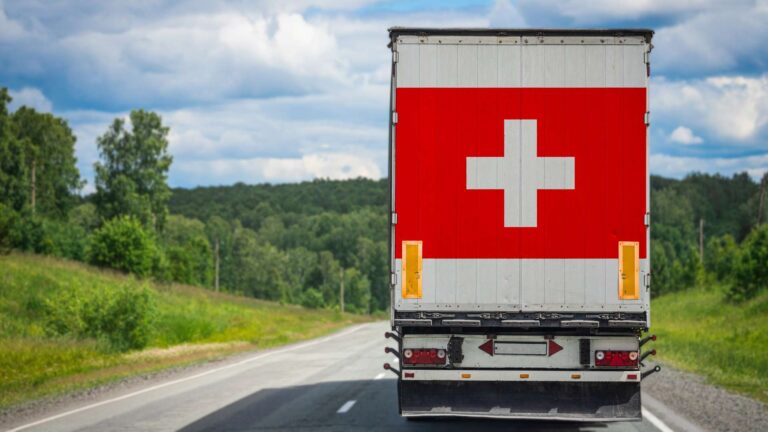Value Added Tax (VAT) in Switzerland – 2025/2026
The Value Added Tax (VAT) in Switzerland is a consumption tax borne by the final consumer. It is applied at each stage of the production and distribution of goods and services. Businesses can recover VAT paid on their business purchases by offsetting it against the VAT collected on their sales. Services supplied abroad are not subject to Swiss VAT; VAT is instead levied at import. As of 1 January 2024, rates are 8.1% (standard), 2.6% (reduced), and 3.8% (accommodation). Certain transactions—such as medical and educational services—are VAT-exempt. Businesses may also opt in to VAT voluntarily in order to recover VAT paid on their purchases.
Overview
VAT in Switzerland is a general consumption tax paid by the final consumer. It is levied at every stage of the production and distribution of goods and services within Switzerland. The VAT due on transactions is calculated on the invoiced or paid amount for goods and services. Businesses subject to Swiss VAT may recover input VAT incurred on purchases by deducting it from VAT collected before filing their return with the Federal Tax Administration (FTA).
Cross-border Services and Import VAT
Services supplied abroad are not subject to Swiss VAT so that only domestic consumption is taxed. On importation, VAT is charged as well, and Swiss businesses that purchase services from foreign suppliers must often self-assess VAT on such acquisitions under Article 45 of the Swiss VAT Act (MWSTG/LTVA).
2024 Rate Change and Invoicing Across Year-End
From 1 January 2024, new VAT rates entered into force: 8.1% standard rate, 2.6% reduced rate, and 3.8% special rate for accommodation. Businesses should take particular care when invoicing services spanning 2023/2024, as the applicable rates depend on when the service was performed or the goods delivered.
Exemptions and Voluntary Registration
Some transactions are excluded or exempt from VAT—e.g., medical and educational services, insurance and banking, and certain agricultural activities. Businesses below the turnover threshold can voluntarily register for VAT to recover input tax on their purchases.
The Swiss VAT Number
The VAT number begins with CHE, followed by nine digits, and ends with the extension “MWST/TVA/IVA/VAT” (e.g., CHE-xxx.xxx.xxx TVA). This number is essential for all correspondence with the tax authorities and is issued with the VAT registration confirmation.
Turnover Threshold and Obligation to Register
The turnover threshold for mandatory VAT registration in Switzerland is currently CHF 100,000. Businesses that generate taxable turnover above this amount in Switzerland must register. This also applies to foreign businesses supplying services in Switzerland, provided they are not exclusively making VAT-exempt supplies. Businesses below the threshold may opt in voluntarily to reclaim VAT on their purchases.
VAT Registration in Switzerland
Registration can be completed online. The process is optimized for modern browsers and uses web standards (e.g., AJAX) for real-time validation. Data is auto-saved at each step and can be retrieved in later sessions. Companies should prepare all required information, such as the Commercial Register extract and the UID/IDE number.
Assistance
For more information on VAT registration and turnover thresholds, you can contact RISTER – Fiduciary in Geneva.
VAT Return Methods in Switzerland
1) Effective (Actual) Method
As set out in Article 36 LTVA, this method is generally filed quarterly. The tax due for the period equals VAT collected on Swiss supplies minus input VAT previously paid (on purchases, imports, and other taxable acquisitions). Only the netVAT is paid to the tax authorities, ensuring a fair contribution.
2) Net Tax Rate Method (Saldo-/Taux de la dette fiscale nette)
Governed by Article 37 LTVA and Articles 77–96 OTVA, this simplified method is designed for SMEs. Sector-specific net tax rates are applied to gross turnover (incl. VAT) to determine VAT payable. Input VAT is not calculated separately. Returns are generally semi-annual, reducing admin workload.
3) Flat-Rate Method (Forfaitaire)
Under Article 37(5) LTVA and Articles 97–100 OTVA, this applies mainly to public service units, schools, private hospitals, associations and foundations. Sector-specific flat rates are applied to total turnover incl. VAT. Returns are semi-annual, with no separate input-tax calculation.
Filing Frequency and Deadlines in Switzerland
In 2024, filing may be monthly, quarterly, or semi-annual. From 1 January 2025, following a VAT law revision, eligible businesses (notably SMEs below certain turnover limits and with a good compliance history) may also choose annual filing.
Current Practice and Deadlines
-
Net tax rate (saldo) filers: generally semi-annual returns.
-
Effective method: quarterly returns.
-
Returns must be submitted within 60 days after the end of the relevant period.
-
VAT payable is due within 60 days after period end (Art. 86(1) LTVA). Payment extensions may be granted upon justified request; statutory due dates remain unchanged and late interest accrues automatically.
Calendar Deadlines (Illustrative)
-
Q1: file & pay by 30 May
-
Q2 / H1: by 30 August
-
Q3: by 30 November
-
Q4 / H2: by 28/29 February
From 1 January 2025: Annual Option
The revision also introduces annual filing under conditions (e.g., taxable turnover ≤ CHF 5,005,000 and timely compliance over the last three tax periods). Businesses choosing annual filing must make advance payments, reconciled with the final liability when the annual return is filed. Overpayments are refunded; interest may apply on late or insufficient payments.
Representation and Liability Changes
The revision includes changes on fiscal representation and liability. For example, directors/managers may be jointly liable for VAT debts under certain conditions, securities may be requested by the VAT authority, and foreign businessesmay no longer need a Swiss fiscal representative under specific circumstances.
VAT Accounting Methods
Agreed Consideration (Accrual Basis) — Art. 39(1) LTVA
VAT is declared and input VAT deducted based on invoices issued and received during the return period.
Consideration Received (Cash Basis) — Art. 39(2) LTVA
VAT becomes due upon actual receipt of payment for goods/services supplied, and the right to input tax deduction arises upon payment. This method requires FTA authorization and must be maintained for at least one fiscal year.
Input Tax (Vorsteuer) in Switzerland
Input tax allows businesses to deduct VAT paid on business-related purchases from VAT they collect on sales. Since VAT is a consumption tax, businesses act as intermediaries: they collect VAT from customers and remit it to the state, while reclaiming VAT on their own business expenses.
Practical Effect
If input VAT on purchases exceeds VAT collected on sales in a period, the business may request a refund of the difference. This system ensures that only the value added at each stage is taxed—not total turnover.
Input Tax Adjustments (Self-Supply & Private Use)
Sole Proprietors
They must adjust input VAT previously deducted on expenses partly used for private purposes. The correction is reported under Box 415 of the VAT return, at least once per year, to reflect private use of items initially treated as business expenses.
Legal Entities
Companies must declare the private portion of expenses used by executives/employees as income under Box 415. This should be done at least annually. These rules ensure VAT is properly calculated on actual consumption, maintaining a clear separation between business and private use.
Subsequent Input Tax Deduction (Late Input VAT Relief)
Businesses may adjust input VAT they could not initially claim—often because they were not yet VAT-registered at the time of purchase. This is governed by Article 32 LTVA.
Conditions
-
Change in use or status: The business must prove that conditions for input VAT deduction became applicable afterthe original purchase (e.g., change in use or subsequent VAT registration).
-
Proper documentation: The adjustment must be documented and reported under Box 410 with supporting schedules and documents.
-
Availability and current value: Goods/services must still be available and have current value when the deduction conditions are met.
Note: Certain services (e.g., consulting/management) are presumed consumed immediately after purchase and are generally not eligible for subsequent deduction unless proven otherwise.
Accounting in Switzerland
Simplified Accounting
Small sole proprietorships and partnerships with annual turnover < CHF 500,000, and certain associations/foundations not registered in the Commercial Register, may opt for simplified cash accounting (recording receipts/payments and assets). It must still comply with Art. 957a(2) CO and, for VAT, Art. 128(1)(b) OTVA.
General Accounting Standards
Corporations (SA/AG, Sàrl/GmbH) follow the Swiss Code of Obligations (CO). Under Arts. 957 et seq. CO, all businesses must keep accounts that faithfully reflect their financial position (minimum structure for balance sheet, income statement, and notes).
Larger/Listed Entities
Listed or large entities, and some cooperatives/foundations, must prepare financial statements under a recognized standard (IFRS or Swiss GAAP FER), especially for consolidated accounts. Hidden reserves remain permitted, but transparency is encouraged. Cash-flow statements, additional disclosures, and a management report may be required.
Retention of Records
Books, vouchers, management and audit reports, and annual accounts must be retained for 10 years (Art. 958f(1) CO). They may be stored on paper or electronic media, provided reliable access is ensured. Real-estate-related records must be kept for 20 years (VAT Act Art. 70(3) with reference to Art. 42 LTVA).
Foreign Businesses and Swiss VAT
A foreign business must register for Swiss VAT if it supplies services in Switzerland and has a global taxable turnover of at least CHF 100,000. Non-profit sports/cultural associations and public-interest institutions benefit from a higher threshold of CHF 250,000. For VAT purposes, Swiss territory includes Liechtenstein, the municipality of Büsingen (DE), and the Swiss sector of EuroAirport Basel-Mulhouse.
Start of Liability
VAT liability for foreign businesses begins with the first taxable supply in Switzerland. For advance payments, liability starts on the invoice date or, absent an invoice, on receipt of payment.
Examples of Taxable Supplies in Switzerland
Processing of Goods Treated as a Supply of Goods
The following are treated as supplies of goods subject to Swiss VAT when carried out in Switzerland:
-
Construction and masonry work
-
Landscaping
-
Carpentry and joinery
-
Tiling
-
Painting
-
Installation of windows, kitchens, and built-in cupboards
-
Electrical installations
-
Demolition, cleaning, maintenance, and repair of immovable property
-
Exhibition stand assembly
-
Cleaning of movable goods (e.g., machinery)
-
Installation, commissioning, testing, adjustment, maintenance or repair of goods
-
On-site software installation at the customer’s premises
Carrying out such supplies in Switzerland may trigger VAT registration for a foreign business, regardless of whether materials are provided.
Fiscal Representative in Switzerland and Guarantees
Foreign businesses must appoint a fiscal representative domiciled or established in Switzerland (Art. 67(1) LTVA). Appointing a representative does not create a Swiss permanent establishment (Art. 67(3) LTVA).
Document Availability
All documents necessary to calculate Swiss VAT must be available at the representative’s office within a reasonable time and until the expiry of the tax claim (Art. 42 LTVA). These include accounting records, purchase orders, delivery notes, customer invoice copies, proofs of payment, supplier invoices, and customs documents.
Exemption from Swiss VAT Registration for Foreign Businesses
Under Art. 10(2)(b) LTVA and Art. 121a OTVA, a foreign business is not required to register for Swiss VAT if it supplies only certain types of services, regardless of turnover:
-
Out-of-scope supplies (Art. 21(2) LTVA)
-
VAT-exempt supplies (Art. 23 LTVA)
-
Supplies of certain energy (electricity, natural gas, or heat via network) to Swiss VAT-registered persons
-
Services located in Switzerland under Art. 8(1) LTVA
Providers of telecoms or e-services to private individuals (non-VATable persons) do not benefit from this exemption. Foreign suppliers meeting the VAT liability conditions must charge Swiss VAT on all taxable Swiss supplies.
Voluntary Registration and Refunds
Where the exemption applies, a business may voluntarily register from the start of the current tax period and must remain registered for at least one tax period (Art. 11 LTVA).
Foreign businesses exempt under Art. 10(2)(b) LTVA that do not opt in are entitled to a refund of Swiss VAT on imports and services received in Switzerland (Art. 107(1)(b) LTVA; Art. 151(2) OTVA).
However, businesses making only out-of-scope supplies and choosing not to register are not entitled to VAT refunds (Art. 121a OTVA).
Q&A on Key Swiss VAT Concepts
What territories are covered by Swiss VAT?
Switzerland, the Principality of Liechtenstein, and the municipality of Büsingen (Germany). In the valleys of Samnaunand Sampuoir, VAT applies only to services.
What is a “supply” (prestation) under Swiss VAT?
It covers supplies of goods and services—any transaction where a transfer of value can be identified.
How does VAT define a “supply of goods”?
It includes transferring the power to dispose of a good economically, handing over a good after processing, and making a good available for third-party use or enjoyment.
What is a “service” under VAT law?
Any transaction not classified as a supply of goods, covering a wide range of intangible activities.
What is “consideration” (contre-prestation)?
The value given by the recipient or a third party in exchange for a supply. It is the basis for calculating VAT due.
When is a supply “exempt from tax”?
A supply normally taxable but specifically exempted (e.g., exports), which generally preserves the right to input tax deduction.
What is “acquisition tax” (impôt sur les acquisitions) and when can it be deducted?
VAT due on services and certain goods acquired from abroad. It may generally be deducted as input tax if conditions are met.
How does subsequent input tax deduction work?
If conditions for input VAT deduction arise after the initial acquisition, an adjustment can be made to deduct that VAT later (e.g., assets later used in a taxable activity).
Difference between “out-of-scope” and “exempt” supplies?
Out-of-scope supplies are not subject to VAT and do not allow input tax deduction. Exempt supplies are free of VAT but may allow input tax deduction under certain conditions.
RISTER – Fiduciary in Geneva
Swiss VAT is complex and requires a thorough understanding of obligations and specific regulations. Domestic and foreign businesses must navigate detailed filing processes, input tax rules, and document retention requirements. While the law is strict, it provides options—such as exemptions and input tax deduction—to simplify certain transactions and reduce the overall tax burden.
RISTER, an expert in Swiss taxation, plays a key role in helping businesses comply. RISTER provides a full range of services, including VAT return assistance, fiscal representation for foreign companies, and strategic advice to optimize VAT management—as well as Swiss company formation and establishment services in Switzerland.


